|
|
|
Sort Order |
|
|
|
Items / Page
|
|
|
|
|
|
|
| Srl | Item |
| 1 |
ID:
138414


|
|
|
|
|
| Summary/Abstract |
Refugee camps are often treated as incubators of social unrest, violence, terrorism, and illicit trade. This provokes their overseers in the United Nations (UN) and other relief agencies to conduct frequent social engineering to enhance the camps’ legibility. Hence, we see orderly, perpendicular rows, standardized units from redistricting to the allocation of diapers, and so forth—all of the follies of high modernism that James Scott predicted in "Seeing Like a State," but writ small. Indeed, my qualitative research from the Za’atari refugee camp, located in Jordan along the Syrian border, indicates that refugees, especially middle-class ones like Syria’s, rebel against uniformity—or what Scott describes as “metis”—and seek to recreate their domiciles as best they can from the meager canvas tents and campers allotted to them. Put simply, they see their surroundings more as the disorderly “sidewalk ballet” of Jane Jacobs’ Greenwich Village than the high modernist yet sterile functionalism of Robert Moses. This holds important policy implications for the future of how we devise refugee camps, which increasingly resemble small cities; how we settle internally displaced persons (IDPs); and how we deal with the aftermath of mass population displacements. From direct cash transfers to the districting of refugees, some bureaucratic flexibility is required but so is an acknowledgement and embrace of refugees’ do-it-yourself ethos that is rooted in their resistance to authority and trauma from violence. Drawing from the literature in social anthropology and political science, this article presents new evidence from Za’atari that disputes the utility of a high modernist approach to the social engineering of large displaced populations.
|
|
|
|
|
|
|
|
|
|
|
|
|
|
|
|
| 2 |
ID:
138412
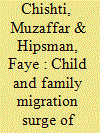

|
|
|
|
|
| Summary/Abstract |
In the summer months of 2014, a surge in the number of unaccompanied alien children (UAC) and family units from Central America arriving at the U.S.-Mexico border precipitated a crisis for the U.S. government and a firestorm in political and media circles. In recent years, no issue in regional migration (involving the United States, Mexico, and Central America) has attracted this level of red-hot attention and controversy. This article will first examine the numbers—and the trends—of the migration of unaccompanied children prior to and in the wake of this summer’s crisis. It will explore the complex set of push and pull factors responsible for the surge, including security concerns in Central America, structural economic dynamics in the region, the desire for family reunification, U.S. immigration policies that mandate special treatment of child migrants, and the role of smuggling networks. It will survey the policy responses of the governments of the United States, Mexico, El Salvador, Guatemala, and Honduras to the surge—and their impacts. Further, it will examine the ramifications of the child migration influx at the federal, state, and local levels in the United States, as well as the effects of the crisis on the broader political immigration debate in the United States. Lastly, the article will offer recommendations on how to better respond to child migration—both in the short term and on an ongoing, long-term basis.
|
|
|
|
|
|
|
|
|
|
|
|
|
|
|
|
| 3 |
ID:
138410
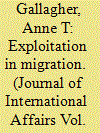

|
|
|
|
|
| Summary/Abstract |
For the millions of people who want or need to move, migration has become progressively more expensive and perilous. Legal access to preferred destinations is now an option only for the privileged few. The rest are forced into the arms of those able to help them circumvent ever-increasing controls and deterrents. Migrant smuggling, the business of moving people across borders for profit, is a sordid and dangerous enterprise, often placing lives and well-being at serious risk. And the dangers do not end there. Many of the world’s migrants find themselves deeply in debt to recruitment agencies, brokers, and sometimes their own employers before they even start work. In too many cases, these asymmetrical arrangements reach the level of human trafficking: Victims are tricked or coerced into situations of exploitation from which they cannot escape. This article argues that such practices, while unacceptable, are also inevitable. Without profound reforms to global migration regimes—and indeed to the organization of the global economy—there is likely no effective solution to migration-related exploitation. But important steps can be taken, even within the limits of current political constraints, to minimize vulnerability and harm. These include promoting political and legal acceptance of basic rights for all migrants, developing quality control systems for international labor recruitment, eliminating recruitment fees and sponsorship schemes, and co-opting civil society in an effort to increase transparency and accountability of governments and business activities.
|
|
|
|
|
|
|
|
|
|
|
|
|
|
|
|
| 4 |
ID:
138407
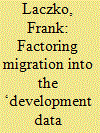

|
|
|
|
|
| Summary/Abstract |
Migration stories appear in the news around the world nearly every day. Migration is one of the most hotly debated policy issues and has grown in importance on the global agenda of the United Nations (UN). But how much do we really know about migration and the impact of migration policies and programs? Do we have the data to make a strong case for the inclusion of migration in the post-2015 development agenda? This article takes a hard look at the migration evidence base and outlines a set of recommendations to achieve a “migration data revolution” over the next decade. The article is written from a global perspective, and discusses data on both regular and irregular migration. It also considers how data are shared and used by policymakers, and why there is so little data on the impact of migration programs.
|
|
|
|
|
|
|
|
|
|
|
|
|
|
|
|
| 5 |
ID:
138418


|
|
|
|
|
| Summary/Abstract |
There are more international migrants today than at any other time in history, and at the same time, the globalization of supply chains and financial systems has spawned vast and once-unimagined networks of transit, communication, and distribution. This means people are moving in ways that are not always captured in accepted international migration statistics and to countries that are ill-equipped to develop or implement a national immigration policy. The confluence of these factors has contributed to a globalization of ‘undocumentedness,’ and yet, the global conversation about undocumentedness still orients itself to the United States and Europe. A quick survey of extant literature on undocumentedness, international migration, and informal labor points to a significant gap in scholarship on the causes and consequences of permanent and growing cross-border undocumented migration between developing countries, and as a global phenomenon. Research on undocumented immigrant communities in the West frequently focuses on social justice or national security concerns in a single place with a large undocumented population, rather than placing the emergence of those communities within the broader context of how international migration has changed. For example, undocumented migrants in the West are likely to have been undocumented migrants in developing or middle-income countries as well. Migrant networks often span many countries at once. This article will position undocumentedness as a global phenomenon, examining how economic globalization has contributed to a globalization of low- to middle-income migration to regional powers with limited-to-no migration management strategy or infrastructure. It will also consider some of the challenges undocumented migration poses in countries dealing with endemic poverty, massive internal migration, and structural race/caste/tribal fissures. Finally, it will consider what citizenship and belonging mean in this new global era.
|
|
|
|
|
|
|
|
|
|
|
|
|
|
|
|
| 6 |
ID:
138415


|
|
|
|
|
| Summary/Abstract |
Recent years have seen the emergence of an international market for higher education. It is likely that the number of international students worldwide may have reached 5.2 million in 2014, with these students responsible for expenditures for tuition, accommodation, and other living expenses of no less than $50 billion. Since 1970, the number of international students is estimated to have doubled every fifteen years, on average, and the pace may be accelerating because of the expanding pool of tertiary education graduates in emerging economies where more education suppliers are entering the market. Experts predict that there will be at least 8 million international students by market. 2025, a larger group than the total population of Switzerland, Norway, or Ireland. This article traces the growth of student migration to the Cold War period when it was driven largely by the competition between the Soviet bloc and the West for influence in the developing world, how it has since been transformed (and now is being driven mainly by competition for dominance in technological innovation and trade), and concludes with questions on what it means for the less-developed countries of origin.
|
|
|
|
|
|
|
|
|
|
|
|
|
|
|
|
| 7 |
ID:
138411


|
|
|
|
|
| Summary/Abstract |
Depending on the scale and distance of migration, a variety of challenges face both those moving because of climate impacts and the communities receiving these migrants. The lessons drawn from resettlements and planned relocations thus far—most notably in the Carteret Islands of Papua New Guinea—underscore the importance of adequate funding, careful planning, restoring traditional livelihoods, and ensuring voluntary community participation throughout the entire process. Critical hurdles persist, however, particularly for the most vulnerable communities within nation-states. This article explores the importance of adequate funding and identifies the dangerous and nagging impediments present, even as climate-induced migration advances in the adaptation discourse. With a focus on the Carteret Islanders’ ongoing relocation and resettlement to the island of Bougainville, this article argues that communities may face economic development and political gaps. Economic development gaps inhibit communities’ abilities to address redevelopment needs that elude appropriate classification for funding because they are neither strictly “climate” nor “development” categories. Additionally, political gaps exacerbate the challenges of accessing existing funding for local communities that are at odds with the national governments that purportedly represent their interests. These gaps compound the general lack of adequate funding for climate change mitigation and adaptation. Considering models for a new framework, this article explores the applicability of existing community-oriented funding regimes to address the political and economic development challenges that climate migrants face.
|
|
|
|
|
|
|
|
|
|
|
|
|
|
|
|
| 8 |
ID:
138408
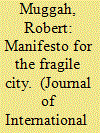

|
|
|
|
|
| Summary/Abstract |
After more than a century of steady city expansion in northern countries, the direction of twenty-first century population growth is shifting southwards. Over the next five decades, Africans, Arabs, and Asians will migrate in unprecedented numbers to cities, especially to their slums. Many of these urban settlements are insecure, disorganized, and violent. These are fragile cities and such migrations can threaten their inhabitants, countries, and the wider neighborhood. The analytical focus on fragile cities offers a novel scale when compared to fragile and failing states. It is also one that is preoccupying national policymakers, military strategists, and development experts. Drawing on theoretical and empirical contributions from geography, criminology, and sociology, this article identifies four mega-risks shaping urban fragility—the transformation and concentration of violence, turbo-urbanization, youth bulges, and the relentless penetration of new technologies. It also considers successful approaches to reversing city fragility, including twinning fragile cities with healthier and wealthier ones, investing in hotspot policing, interventions addressing at-risk youth, support for inclusive and cohesive urban growth, and the targeted application of new technologies.
|
|
|
|
|
|
|
|
|
|
|
|
|
|
|
|
| 9 |
ID:
138409
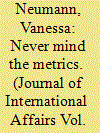

|
|
|
|
|
| Summary/Abstract |
Measuring and mapping human trafficking are challenging for several reasons and therefore do not lead to effective counter-trafficking strategies. Understanding the drivers of human migration, however, is a much more promising approach for developing policies with risk-mitigating strategies. Insofar as the patterns of human migration are intertwined with other aspects of illicit trade, they can serve as an early warning signal of vulnerabilities in the global trade system for criminal activity. Tracking the financial links between human trafficking and other crimes provides various options for effective degradation and disruption of illicit trafficking networks.
|
|
|
|
|
|
|
|
|
|
|
|
|
|
|
|
| 10 |
ID:
138413
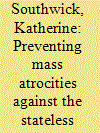

|
|
|
|
|
| Summary/Abstract |
This article constitutes a call for solutions to the prolonged and worsening plight of the Rohingya, a largely stateless, Muslim minority based in western Myanmar. Over the past year, a number of experts have invoked the possibility of genocide against this group, citing a dangerous combination of ethnic and religious tensions, discriminatory deprivation of basic rights, restricted access to food and medicine, hate speech, and large numbers fleeing the country. Yet up to now, domestic and international responses to the Rohingya crisis have been weak, with serious consequences for this community, the prospects of democratic transition and rule of law in Myanmar, and the integrity of international law. This article highlights the basis for why the possibility of genocide has been raised and argues that the international community has legal obligations to act. These considerations could contribute to sharpening focus on the urgent need for regionally coordinated solutions, based on enforceable principles of nondiscrimination and inclusion, specifically guarantees of citizenship rights and protection. These are critical elements of democratic development in divided societies like Myanmar.
|
|
|
|
|
|
|
|
|
|
|
|
|
|
|
|
| 11 |
ID:
138416
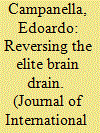

|
|
|
|
|
| Summary/Abstract |
Since the end of the World War II, Europe has been repeatedly afflicted by waves of brain drain, with varying degrees of intensity across time and countries. But these outflows of human capital have rarely turned into some form of brain circulation, nor have they been compensated by adequate inflows of foreign talents. Now, the Digital Revolution and the economic restructuring imposed by a never-ending Eurozone crisis are amplifying the costs of these human capital losses, creating skills shortages that are undermining Europe’s ability to compete globally. So far, the European Commission (EC) has taken steps to loosen immigration policies to attract skilled foreigners from across the world. A thorough historical analysis, however, will show that it is high time for European governments to reattract their runaways. Policies aiming at remigration, rather than immigration, will generate greater political and economic efficiency.
|
|
|
|
|
|
|
|
|
|
|
|
|
|
|
|
| 12 |
ID:
138417
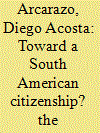

|
|
|
|
|
| Summary/Abstract |
Migration law may be discussed as an example of a clash between two central contradictory globalization processes: first, the transformation of political membership through new forms of quasi-citizenship and their impact for traditional understandings of identity and belonging in the national polity, and second, the securitization of migration and the attempt by the state to control its borders, considered as its “last bastion of sovereignty.” The outcome of this dispute results in conflicting mechanisms of inclusion and exclusion and in illiberal state practices, contrary to fundamental rights, with profound implications for the rule of law in Europe and elsewhere. South America has usually been neglected in academic debates on migration law. This is regretful for two main reasons: first, the development of new liberal ideas on migration in the region which challenge established assumptions on the regulation of migration in Europe, the United States, and elsewhere, and second, the parallel establishment of a South American citizenship. This article will look at this aspect, in particular the Mercosur Residence Agreement, which establishes a free movement of people regime in South America. Its drawbacks and potential will be outlined before exploring possible future scenarios and their importance for other regions, including the European Union (EU).
|
|
|
|
|
|
|
|
|
|
|
|
|
|
|
|
|
|
|
|
|